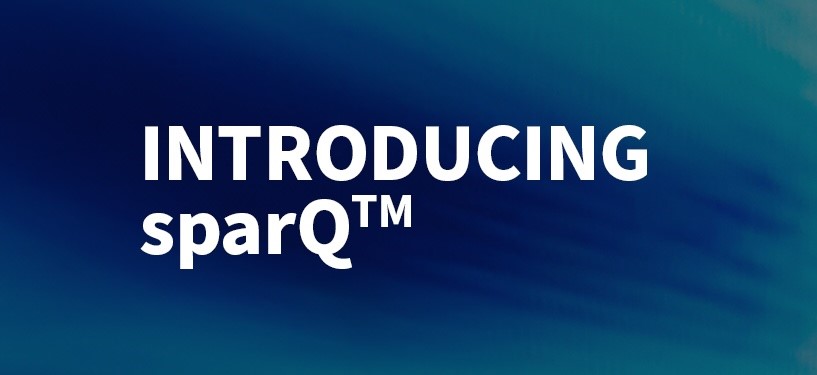MassTLC and Startup Institute partnered to bring together hiring companies, industry professionals, and tech talent at the first-ever Discover Tech Boom Boston: Career Fair and Learning Experience.

The hiring companies in attendance, Amadeus, Bullhorn, Casenet, Harmonic Drive, Kaspersky Lab, Wayfair, and WinterWyman, met with nearly 400 prospects over the course of the event. Throughout the evening, instructors from Startup Institute shared insights on a range of topics — everything from optimizing your LinkedIn profile to evaluating an offer. We have compiled the key learnings from each session below.
Understanding the Boston Tech Scene
Rich Diteri, CEO of Startup Institute, kicked off the sessions by talking a bit about Boston as a leading innovation ecosystem and what makes it different from other places, like Silicon Valley (hint, we have a lot of B2B here). He then provided a list of resources — everything from publications to job listing sites and digital innovation labs — for startups, job seekers, and those interested in learning more about the Boston Tech scene.
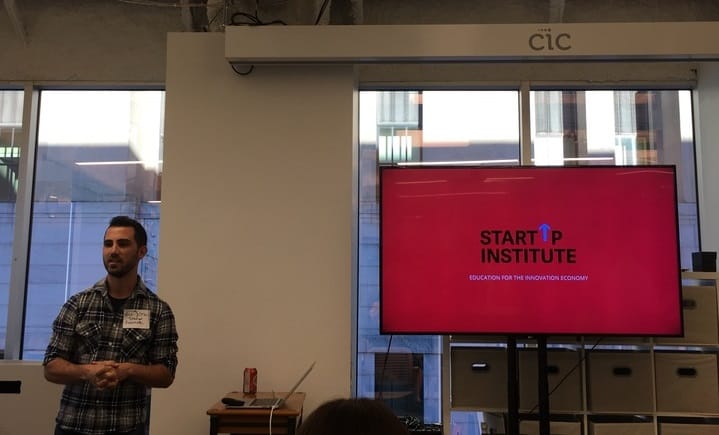
His most useful and encouraging piece of advice involved working the “coffee chat,” the primary means of networking in Boston. Rich emphasized that a coffee chat has to be a two-way street — both participants both give and receive value. His advice was to avoid the direct ask for a job but to discuss your interests and passions and ask if the other person knows of opportunities or can make other connections for you. Equally important is for you to use the opportunity to suggest connections for the other person. Building goodwill by helping others leads to long-term success.
What Should and Shouldn’t be in Your LinkedIn Profile
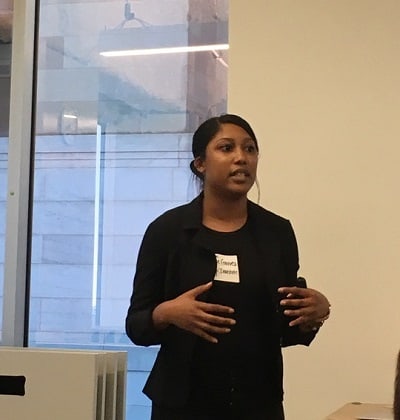
Shanice Graves, Associate Director of Startup Institute, gave a highly actionable review of what a strong LinkedIn profile should contain. Here three top items:
- Good headshot — use good lighting, do not include others in your photo, keep the focus on your face, wear professional attire. If you don’t have a professional headshot, have a friend take a picture that utilizes all of these elements
- Headlines that work and a directional summary — do not just use your current job title for your headline; instead, describe how you want to be viewed (e.g., Profit Specialist/Helping Business Coaches, Consultants & Accountants To ATTRACT, WIN & RETAIN more profitable clients). Write a headline that points toward your end goal, and don’t forget to show how you add back to community
- Additions to enhance your profile — add articles, videos related to your description; always have a summary; add new info about jobs; include academic info; link to multiple communities and companies
Finally, Shanice pointed out that the op thing any job seeker should do is: go to your LinkedIn connections and reach out!
Sales Isn’t Evil – How to Make Good Money Early
David Vencis, Program Director at Startup Institute, called on his experience as a sales coach to walk through what makes a good salesperson. His fundamental rule was “don’t be a crocodile salesperson.” Crocodiles have huge mouths and small ears. A good salesperson is the opposite — he/she listens more than speaks.
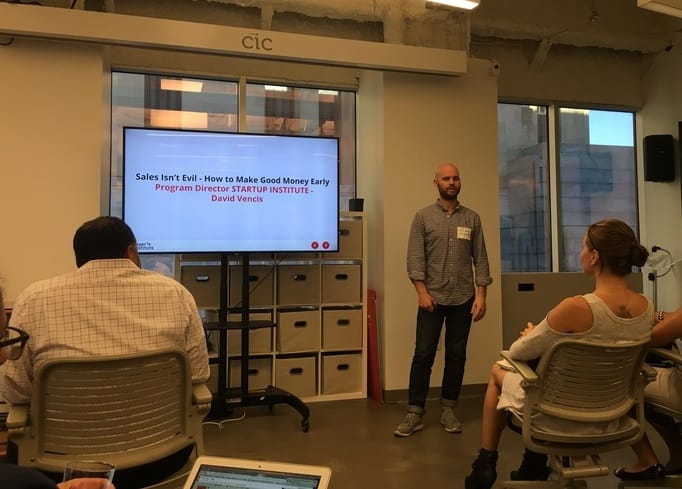
For David, the three key qualities of great salespeople are:
- They listen more than they speak
- They ask great questions, respectfully challenging people’s preconceived notions, as a way to identify the real pain points and offer appropriate solutions.
- They show empathy
David also explained the importance of “running toward NO.” Even though it’s counter-intuitive, good sales managers incent salespeople to get NOs. The vast majority of sales efforts will end in NO, so salespeople can’t fear that answer. By incenting salespeople, especially young ones, to get NOs, managers are encouraging them to do the hard work (cold calling, email outreach, follow up) that they need to do to eventually get to a YES.
Finally, David reminded attendees that salespeople, like athletes and musicians, practice their craft and work to get better at it.
Can I Really Code? How to Use Your Experience to Break into the Tech Scene
Startup Institute alum, Andrew Williams, is a software engineer at Wayfair. He shared his experience as a non-computer science major navigating a non-traditional path into a software development role.
Andrew’s suggestions for other non-traditional candidates who want to make the move into software development:
- Find out what you’re good at and passionate about. For example, if you’re visual, learn front end development.
- Research program languages and what they do, and learn the ones that are applicable to your interests
- Start with free online resources to teach yourself. You can move to paid online courses and code bootcamps later.
- Build some personal projects for yourself or others to show what you can do.
- Get together a portfolio. Github is a good place to host code, but you can also build your own website.
- Know that you will never feel ready, but trust others when they give you a chance. Just do it.
Fit for Culture is as Important as Fit for Function
No career discussion would be complete without a look at the importance of cultural fit for both hiring organizations and potential employees. Wafaa Arbash, Startup Institute Program Manager, walked through ways to determine a company’s culture and whether it is a fit for a job candidate.
Company culture is the personality of a company, and includes the work environment, company mission, values, ethics, expectations, and goals. A candidate can use a variety of resources to learn about the company’s culture:
- Speaking with current and past employees
- Reviewing Glassdoor posts about the company
- Reading articles about the company
- Visiting the company website
- Asking questions during the interview process
This last item is the most difficult, as it is difficult to describe culture. Some of the suggested questions from attendees were:
- “What do you like least about working here?”
- “How does the company develop talent?”
- “What would you improve about how the company does things?”
Wafaa stressed that there are three things that determine an employee’s satisfaction, and all three must be met for the employee/employer cultural fit to be successful:
- Company mission
- People — what are the other employees like?
- Role — does it align with your skills and passions?
If a company makes an offer and any one of these three items isn’t a fit for the candidate, she should walk away. If she does accept the offer, she should be prepared for it to be a short-term role because the poor fit will not allow for long-term success or happiness.
Startup, Rapid Growth, & Enterprise: What Does It Mean to an Employee?
Startup Institute’s VP of Marketing, Justin Miller, walked attendees through the differences
among startups, rapid growth companies in terms of four factors:
- What do you want to do long-term?
- How do you learn?
- What are your near-term financial goals?
- How flexible is your lifestyle?
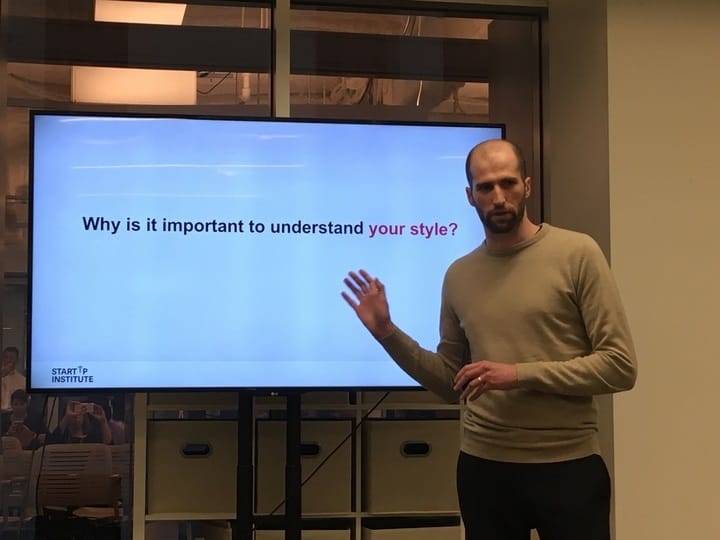
Photo credit: MassTLC
Each type of company offers different environments, from startups which allow for rapid advancement in responsibility but little formal training, while also demanding long hours with short-term lower pay, to enterprises which are the opposite in every dimension. In order to choose the right environment for yourself at this time, you need to answer the four questions above. The answers may change over time depending upon other life factors, so re-assessing over the course of your career is imperative.
Evaluating an Offer: What You Should Consider Before Accepting
One of the most anticipated sessions of the evening was led by Sarah McLaughlin, Director of Admissions at Startup Institute. Sarah walked through the sometimes uncomfortable process of negotiating an offer.
Before entering into any negotiation, in fact, before getting too far into the interview process, you should know your expected salary. Be prepared. Recruiters want to have the salary conversation early in order to not waste their or your time — they are not trying to trick you.
These sites help you gauge if the offer is fair for the role:
- Angel.co
- Glassdoor.com
- Salary.com
- Payscale.com
Before you can negotiate or even make a decision on an offer, you need to know your limits — the minimum that you can afford to make to cover your bills and lifestyle — so make a budget. Be truthful with your self — don’t take offer below your limit without serious consideration.
When it is time to negotiate, ask the recruiter/hiring manager the following:
- How is my success measured? When are salary reviews? What are the KPIs for this role? What is the onboarding plan? Is there any wiggle room on salary at 3 months?
- What can I do in this role that makes my company successful?
The rule of thumb in salary negotiation is that if you get an offer, you can negotiate at most 10-15%. Remind them why they brought you there and are making an offer. This is why it is critical to learn early on in the process what the expected salary range is. Nobody on either side wants to waste time with an untenable offer.
When you negotiate, speak confidently. The situation may be uncomfortable for you, but it’s not for the recruiter or hiring manager. Keep in mind that you can’t just ask for more, you have to give the “why” behind it. Practice this answer, and don’t sell yourself short. You’re worth it! Listen to your gut, and walk away if the offer, salary, or fit is not right.
Remember that there are other elements besides salary that can be part of a negotiation. Look for the BATNA (Best Alternative to a Negotiated Agreement). If there isn’t much leeway on the salary, are there professional development opportunities, parking/transportation subsidies, gym memberships, hardware/software/technology offerings, tuition reimbursement, etc. that might make the offer more attractive. Think about what you might win, don’t ask for things you know are against culture.
Sarah’s four main takeaways for all job seekers to remember when considering an offer are:
- Do your homework
- Know what you’re worth
- Recognize the need to prove your worth
- Don’t work where you aren’t valued
Keynote workshop: Communicating for Impact
The night ended with an animated communication workshop led by Startup Institute COO, Peggy Yu. Peggy described the four “color” types of communication and stressed that it doesn’t matter what type you are, you just need to know your communication style and be able to identify others’. Being able to adjust how you communicate based on the other person’s preferred style is a powerful tool for driving effective communication.
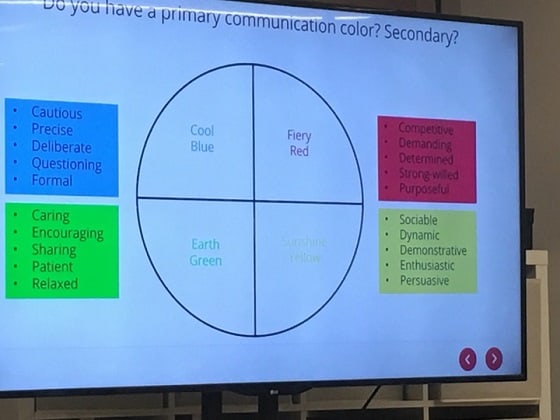
Attendees engaged in a number of role playing activities to illustrate different styles and to workshop possible responses based on communication styles. Managing up, down, and laterally by adjusting communication styles was covered, with an emphasis on the fact that we can’t change others’ behavior, only own own. Being successful requires being able to adjust to different audiences, and this is an extremely powerful tool.


